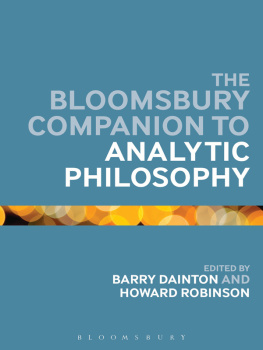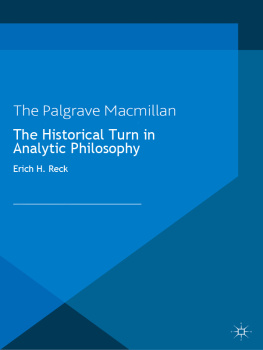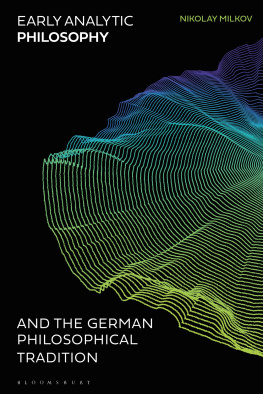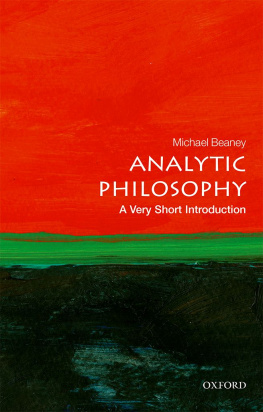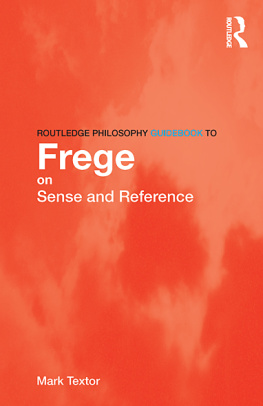The Bloomsbury Companion to Analytic Philosophy
Bloomsbury Companions
The Bloomsbury Companions series is a major series of single-volume companions to key research fields in the humanities aimed at postgraduate students, scholars, and libraries. Each companion offers a comprehensive reference resource giving an overview of key topics, research areas, new directions, and a manageable guide to beginning or developing research in the field. A distinctive feature of the series is that each companion provides practical guidance on advanced study and research in the field, including research methods and subject-specific resources.
Titles currently available in the series:
Aesthetics
Edited by Anna Christina Ribeiro
Continental Philosophy
Edited by John Mullarkey and Beth Lord
Epistemology
Edited by Andrew Cullison
Ethics
Edited by Christian Miller
Existentialism
Edited by Jack Reynolds, Felicity Joseph, and Ashley Woodward
Hegel
Edited by Allegra de Laurentiis and Jeffrey Edwards
Hobbes
Edited by S. A. Lloyd
Hume
Edited by Alan Bailey and Dan OBrien
Kant
Edited by Gary Banham, Dennis Schulting, and Nigel Hems
Leibniz
Edited by Brendan Look
Locke
Edited by S.-J. Savonious-Wroth, Paul Schuurman, and Jonathan Walmsley
Metaphysics
Edited by Robert W. Barnard and Neil A. Manson
Philosophical Logic
Edited by Leon Horston and Richard Pettigrew
Philosophy of Language
Edited by Manuel Garca-Carpintero and Max Klbel
Philosophy of Mind
Edited by James Garvey
Philosophy of Science
Edited by Steven French and Juha Saatsi
Plato
Edited by Gerald A. Press
Pragmatism
Edited by Sami Pihlstrm
Spinoza
Edited by Wiep van Bunge
Forthcoming:
Aristotle
Edited by Claudia Baracchi
Heidegger
Edited by Franois Raffoul and Eric Sean Nelson
Political Philosophy
Edited by Andrew Fiala and Matt Matravers
Socrates
Edited by John Bussanich and Nicholas D. Smith
The Bloomsbury
Companion to
Analytic Philosophy
Edited by
Barry Dainton
and
Howard Robinson

Contents
Barry Dainton
Barry Dainton
Barry Dainton
Barry Dainton
Barry Dainton
Barry Dainton
Barry Dainton
Barry Dainton
Barry Dainton
Barry Dainton
Barry Dainton
Barry Dainton
Barry Dainton
Barry Dainton
Barry Dainton and Howard Robinson
Barry Dainton
Barry Dainton and Howard Robinson
Mary Leng
Barry C. Smith
Richard Gaskin
James Ladyman
Barry Loewer
Helen Beebee
E. J. Lowe
Daniel Stoljar
Mark Johnston
Ferenc Huoranszki
Bryan Frances and Allan Hazlett
Paul Snowdon
Ruth Chang
Andres Moles
Barry Dainton and Howard Robinson
Barry Dainton and Howard Robinson
Howard Robinson
The editors wish to thank everyone who helped with the project. Particular thanks to Richard Gaskin for his detailed comments on Part I, and Bloomsbury editors Sarah Campbell and Rachel Eisenhauer, for their advice, and for their patience.
In this Companion we provide a guide to analytic philosophys past, present, and future; we also attempt to specify whatif anythingis genuinely distinctive about it.
In Part I we provide an historical introduction to the movement, one that takes in Russell and Moores rejection of absolute idealism at the turn of the twentieth century, Freges contributions to logic and the foundations of mathematics, some of Russells subsequent workincluding his influential theory of descriptionsWittgensteins early and later philosophies, logical positivism, and the ordinary language period of Oxford philosophy. We also introduce some of the more influential doctrines of four important American philosophersQuine, Davidson, Putnam, and Kripkealong with more general developments in analytic ethics, and the philosophy of mind. The historical survey ends with the early 1980s. Although it makes no pretense at being exhaustive, the survey does cover the main episodes in the development of the movement in a manner thatwe hopehelps bring what is truly distinctive about analytic philosophy into clear view.
Part II aims to present the state-of-the-art in the major areas of analytic philosophy. Analytic philosophy is a specific movement in philosophy, with a distinct history, but the main burden of the articles is not historical: they exhibit current analytic philosophy in action. The historical material in Part I will lead the reader to the point from which the articles take off.
In Part III we turn to more recent developments, and venture some speculations as to what the near future may hold. Drawing on the earlier historical survey, we also broach the controversial question of what analytical philosophy is, and, in particular how it differs from its foilso-called Continental Philosophy. As further aids to the reader we have included an extensive glossary of key terms and concepts, an annotated bibliography, timelines of major events and publications, and a guide to further resources.
In his 1931 essay The Future of Philosophy, Moritz Schlicklogical positivist and founding member of the Vienna Circleobserved that the history of philosophy hitherto had been one of profound and irreconcilable disagreement. The doctrines of Plato are radically different from those of Aristotle, likewise the metaphysical systems of Leibniz and Spinoza, Kant, and Hegel. This undeniable historical fact might naturally lead one to doubt whether any real progress had been made in Western philosophy in the two millennia of its history; indeed, it might lead one to doubt whether genuine progress in philosophythe sort of progress that the natural sciences have been enjoying since the seventeenth centurywas even possible. Schlick goes on to pose these questions:
Will this chaos that has existed so far continue to exist in the future? Will philosophers go on contradicting each other, ridiculing each others opinions, or will there finally be some kind of universal agreement, a unity of philosophical belief in the world? (1931)
He goes on to note that there is a further consideration that might incline one to pessimism on this score: the fact that many of the competing schools have each had their own different and distinctive methods for arriving at philosophical truths. Descartes method of doubt is very different from Spinozas axiomatic approach, Kants Copernican Revolution takes us in a different direction entirely, as does Hegels dialecticand similarly for Heideggers proposal that we return to the question of Being and attempt to hear its call.
Despite all this, Schlick suggests there are reasons for being optimistic that the long reign of chaos will soon be brought to a close: philosophers will soon stop ridiculing each others opinions. Why? Because an entirely new philosophical methodology has appeared on the scene. Thanks to this new approach the centuries-long impasse will be ended. What is this revolutionary new method? Instead of attempting to uncover distinctively philosophical truths about the nature of reality, philosophers will instead devote their attention to
Next page
